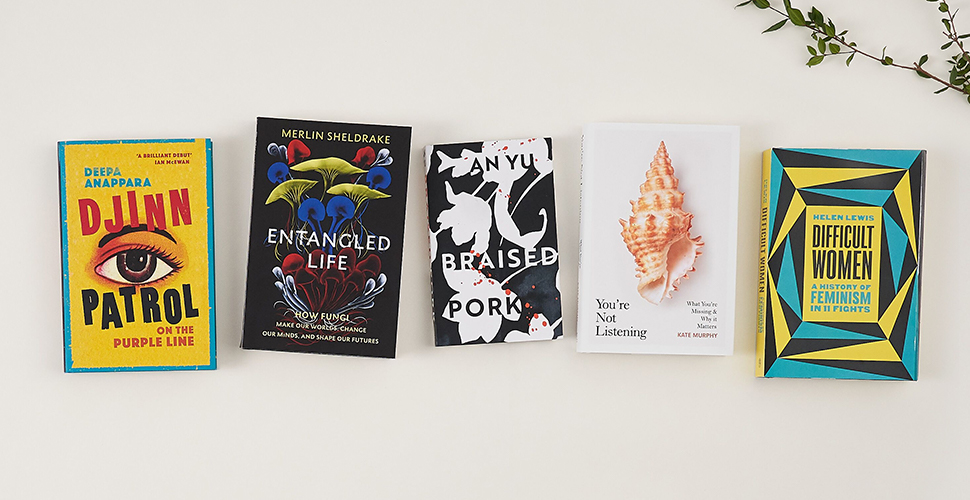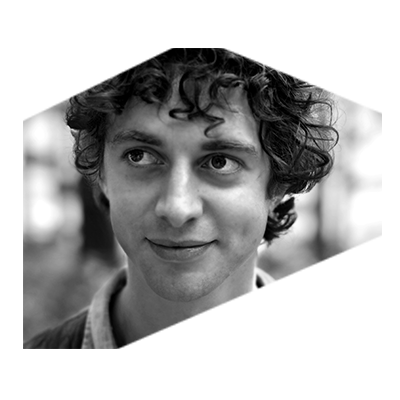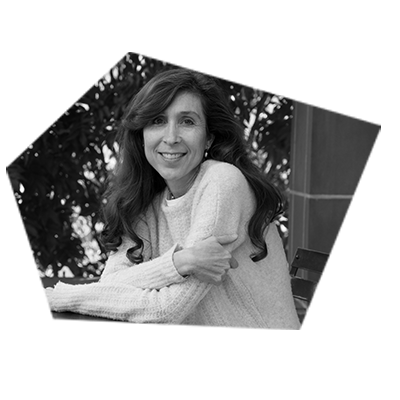- Home |
- Search Results |
- New VINTAGE writers to look out for 2020
New VINTAGE writers to look out for 2020
Over the next six months, we are publishing a brilliant range of debut authors, who are covering everything from the science of listening to fighting feminists to djinns and disappearing children. Then there's the secret world of fungi and a mystical realm accessed through modern Beijing. Anna Fielding talks to the writers to learn more about their upcoming releases.

Deepa Anappara

When Deepa Anappara was a journalist, she would hear stories about children vanishing, children who would disappear and would never be looked for.
'I worked as a reporter in several big Indian cities, Bangalore, Mumbai, Delhi' she says. 'I was mostly covering education and human rights, so I would hear these stories and the police, because the children were largely from very poor communities, were not interested.'
She would also speak to children herself, enjoying hearing them talk about films or TV shows before starting to ask why it was they weren’t in school. 'They were always so bright, quite sarcastic quite often, but I didn’t get to use a lot of what I heard. If you are writing about the effects of a particular policy, then there’s no space to fit in what these children are really like, how funny they are, how they have their own dreams and ambitions.'
Djinn Patrol On The Purple Line, Anappara’s debut novel, is her giving a voice to some of India’s poorest children. That voice mainly comes from 9-year-old Jai, a bundle of swagger and mischief and a lover of reality TV cop shows.
'He thinks he’s a detective,' says Anappara. But it’s not just a game. Jai, with his friends Pari and Faiz, start investigating when a classmate of theirs disappears. They roam through the city, across slums, bazaars and railway lines, all the while learning more about the world and their place in it.
Jai is a charming and funny narrator. 'And in some ways he’s quite innocent,' says Anappara. 'It was important to me to write from a child’s perspective. I wanted to figure out what it would be like to be in this pretty terrible situation where other children are disappearing. India is a hub for trafficking, they could end up in brothels, or forced to work in factories. It’s a dark subject, but looking at it from the perspective of a child means hanging on to some humour.'
There are also the djinns, who the children start to believe may be stealing souls. 'Perhaps not everyone reading will be familiar with them,' she says. 'There are genies in fairy tales, but they are the much friendlier version, whereas in India and the Middle East the djinn is a spirit that can be good or bad, part of a belief system that involves the supernatural: people are afraid of djinns, they worship djinns.'
Anappara was born and grew up in India, but now lives in the UK. She completed the prestigious Creative Writing MA from the University of East Anglia and is now working towards a PhD. She deliberately chose to set Djinn Patrol On The Purple Line in a fictional and unnamed city 'that could be anywhere in India. I didn’t want it to be too close to any real-life disappearances, to intrude on anyone’s grief.'
She descries herself as an idealist. 'I’m writing about communities that are rarely noticed, both internationally and within India. I can’t help but be political in my writing: I do want to make some comment about society and the injustices that take place.'
Djinn Patrol On The Purple Line does make that comment, but in a way that also allows for exuberance, joy and hope.
Merlin Sheldrake

Sometimes it can seem that there’s no wonder left in the world, that everything has been discovered and we don’t marvel at the odd and the beautiful any more. Even a brief conversation with Merlin Sheldrake will shake that cynicism out, like spores dropping from a mushroom.
'Fungi in general are startling,' he says. 'And they make the world strange again, which is one of the reasons I’m so interested in them: they re-strange the world.'
Sheldrake is an expert in fungi and has a PhD in tropical ecology from Cambridge University. In 2016 he was the subject of a New Yorker profile by the nature writer Robert MacFarlane where the two walked through Epping Forest on the London-Essex borders and Sheldrake explained the concept of what he calls 'the wood wide web'.
'Plants through their roots and their shoots connect with fungi and can draw nutrients that way,' he says. 'Fungi are promiscuous and they connect with more than one plant, so you can end up with plants sharing a fungal network underground. In some cases these shared networks can mediate interactions between the plants. The idea of shared fungal networks is the idea of the wood wide web.'
The idea of plants communicating through a network is eye-widening, and Sheldrake’s first book Entangled Life - a combination of science and nature writing, reportage and memoir - is full of these joyful surprises.
Life on land wouldn’t be possible without fungi, says Sheldrake, but even on a more superficial level humans and fungi are bound together. Without fungi there would be no alcohol, no food and no drugs, ranging from penicillin to psilocybin (better known as the magic mushroom). Whilst researching Entangled Life, Sheldrake visited Italy to join a group of hunters searching for white truffles. In California, he visited a fermentation bar. 'They have these big piles of rotting wood chips and you lie in them and it’s supposed to be very good for you. They’re big in Japan, but not big elsewhere, but there is this one in California'. Also on the US west coast there are 'convergences of mushroom nerds who gather to share techniques on growing mushrooms.'
Aside from what he describes as 'strange encounters', Sheldrake has also enjoyed the writing process. 'Most of the writing I’ve done so far has been for technical papers, or academic papers and the feeling can be with academic papers is that no one’s going to read them.'
“Thinking about fungi makes the world look different,” says Sheldrake.
An Yu

China, as An Yu points out, isn’t a country that’s easy to discover through literature, not in the English-speaking world. 'You largely have to rely on works in translation, or histories of the past, the Cultural Revolution and that period,' says the Beijing native. 'I wanted to write a story about contemporary China for a different audience, one that may or may not be acquainted with it.'
Braised Pork is a story of contemporary Beijing, but also one about Tibet and a 'dreamy, magical world of water'. Jia Jia, the central character, is a 30-year-old woman in contractual marriage with a husband 'she never really had much love for'. One morning she discovers her husband dead in their bath, with a mysterious drawing beside him. She had been financially dependent on him, and her journey to discover what happened to her husband is also one of self-discovery as well as magic.
Yu is 26 and has only recently returned to China, having lived in New York and then Paris since the age of 18, allowing her to see her country from both insider and outsider perspectives. 'Originally, I tried to write the book with parts in English and parts in Chinese,' she says. But, in a way, it’s liberating to write about the experience of being in Beijing in a language that is somewhat strange and foreign, it shifts the point of view, even for me.'
Writing in her second language 'acts as a natural editing filter, because I have to think twice before putting something down… When it’s in Chinese, I tend to blabber on more. I write faster, write whatever’s in my mind and when I translate that back into English I have to cut down a lot to think about whether it would make sense for a non-Chinese reader. Then when I translate back I also have to make sure it sounds authentic.'
'Most of the time it’s rather rewarding.'
Yu is a graduate of New York University’s MFA programme, which she did remotely in Paris whilst also completing her second business degree. She’s worked in the fashion industry and still retains an interest in the business side of the fashion world. She’s working on launching a jewellery line of jade pieces that, like Braised Pork, combines traditional Chinese elements with contemporary trends. 'Jade was going out of fashion,' she says. 'I want to bring it back in a modern way. It helps to balance my brain out. I’m not sure I could write if all I did was sit at home and write.'
China, she says, is a country and a culture that interests more people these days and can no longer be ignored in the world.
Kate Murphy

Everyone wants to be heard. And, as a culture, we’ve prioritised ways of being heard, from public speaking workshops to social media, giving individual voices far greater reach than ever before. But if someone is to be heard, someone else needs to listen. Kate Murphy believes we’ve forgotten how to listen, to really pay attention.
'You talk to people and you find out they feel no one is listening,' she says. 'Their husbands aren’t listening to them. People at a party, they’re not listening to them. Politicians aren’t listening to them… We’ve ignored this whole half of the communication dynamic.'
Murphy’s new book You’re Not Listening is all about this quieter half. As a New York Times journalist, she is used to paying careful attention to her interview subjects, but she also spoke to people in a wide range of other listening professions, including hair stylists, bar staff, air traffic controllers, sales people and CIA agents.
'They all had different approaches and I think you could use each different account to look at what approach would work best for you. The commonality, though, with all of those people, is curiosity. Just really having a sense that they don’t know everything and they probably have something to learn from whoever this person is.'
"You could be sitting in a bus station and thinking "I don’t know that person, there’s nothing I can get out of that person" and then you find out they have the largest yo-yo collection east of the Mississippi.'
Murphy was thrilled when she discovered that much of the neuroscience matches up with what we all instinctually feel. A study by Princeton University’s Uri Hasson proved that when two people are really in sync conversationally, their brainwaves literally sync up too. 'The more aligned those brain patterns were, the better the understanding and the more connected the two people felt. I think it’s great to be able to see that scientifically when it’s been a metaphor for so long.'
Other studies showed her that we listen around 50 per cent less than we did 100 years ago. But listening well doesn’t mean being passive. 'On a personal level, the most useful thing for me has been to learn when to stop listening. If I’m telling people to listen better you could think it means you need to subject yourself to someone else’s narcissism or to somebody else’s ideological browbeating and that’s not it at all. In fact, the person who’s doing that really isn’t listening themselves. It’s really important for people to understand that it’s not just something you do when the other person is talking, it’s also something you should do while you are talking.'
But how does it feel for a committed listener to be in the telling role for once? 'I’m having to try really hard,' she says. 'But I am passionate about this and I really think it’s useful, it makes for richer connections with people… That marvellous dance that can occur when you really are listening to each other.'
Helen Lewis

'I’m not talking about being a pain in the arse in a bad way, I’m talking about being a pain in the arse in a good way,' says Helen Lewis of her book Difficult Women: A History of Feminism in 11 Fights. 'And that’s an important distinction to draw. A difficult woman isn’t obnoxious, or a diva, or selfish, or thoughtless; they’re just not a doormat.'
Lewis, now a staff writer at The Atlantic and formerly of the New Statesman, has turned her journalistic skills to the history of feminism, drawing on interviews and archives to find out more about the women who changed history. Women who were often difficult.
'Women’s stuff is often seen as this niche issue,' she says. 'As though 51% of the population are a narrow sect, an interest group.'
'Women will always be asked to put their needs last. They will always be expected to be the supporting characters in other people’s lives, always be expected to selfless, not too demanding. So for any battle around a feminist issue, you have to overcome the first hurdle, which is the idea that you should be nice.'
Although Lewis has found all of her subjects equally fascinating, she does admit to being particularly intrigued by birth control campaigner Marie Stopes 'who seems to have been a nightmare in multiple different ways'. Stopes founded the first birth control clinic in Britain and published the controversial book Married Love, illuminating many kinds of sexual issues for the first time. She was, however, described as hard to work with and, in 1939, sent a book of her poetry to Hitler in an effort to prevent the Second World War 'which gives you some idea of her egomania,' says Lewis. Stopes was also a eugenicist.
'The uncomfortable thing about the history of the birth control movement was that there were a lot of people within that movement for whom it was about the right sort of people having the right sort of children,' says Lewis. 'Not about our modern understanding that women should be empowered to be in control of their own bodies… Anyone who’s ever taken the pill owes a huge debt to someone whose political views would now be repulsive to us.'
Stopes is a strong illustration of one of Lewis’ key points: history and people are complicated. Recently, popular feminism has involved what she terms 'a feel-good hunt for heroines' where women’s stories are shorn of any negativity and 'minced up and served on a plate as inspiration porn'.
'Look,' she says. 'Role models are great, it’s just a problem when they become a substitute for your company having proper parental leave policies or having any women on its board: things that would actually cost money. Feminism gets defanged by turning into a story about inspiration rather than a story about revolution.'
In Difficult Women, Lewis starts to change the conversation. But how difficult is she herself? 'The dedication of the book is to my husband. "For all the difficult women and Jonathan who lives with one". I actually wish I was more of a difficult woman, but I think I’m still too much of a people please. I’m hoping age is going to wear that away.'